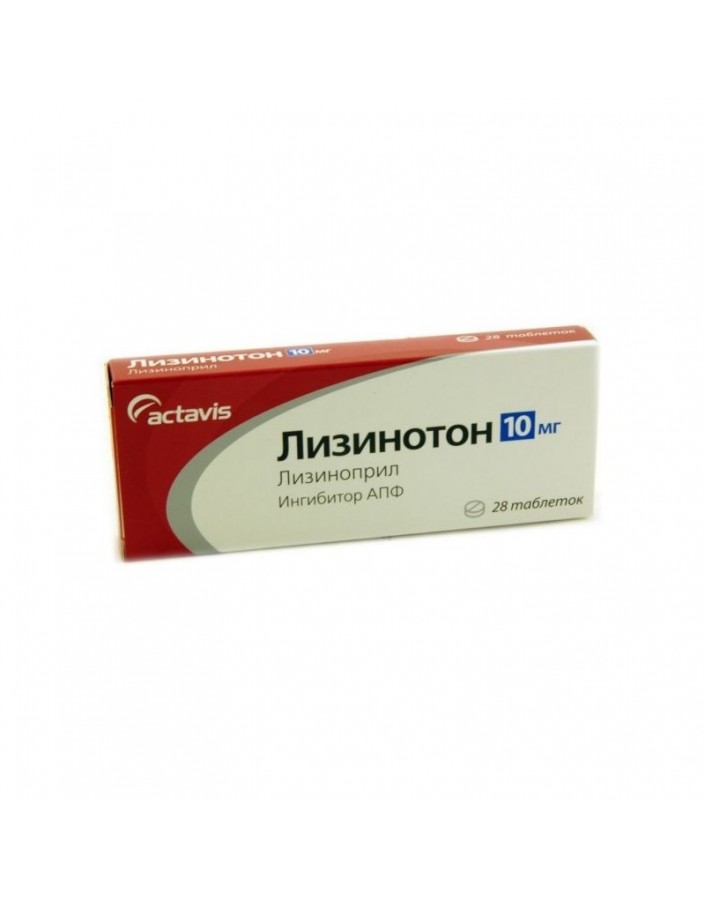




Security policy (edit with Customer reassurance module)

Delivery policy (edit with Customer reassurance module)

Return policy (edit with Customer reassurance module)
Lisinoton - tablets: 1 table. contains lisinopril (in the form of dihydrate) 5, 10 and 20 mg; excipients: mannitol, Calcium hydrogen phosphate dihydrate, pregelatinized corn starch, croscarmellose sodium, Magnesium stearate.; in packing of 28 pieces.
Lisinoton has a hypotensive, vasodilator, cardioprotective, nephroprotective effect.
Arterial hypertension (monotherapy or in combination with other antihypertensive drugs);
chronic heart failure (as part of combination therapy for the treatment of patients taking digitalis and / or diuretics);
acute myocardial infarction (to maintain stable hemodynamic parameters and prevent left ventricular dysfunction and heart failure);
diabetic nephropathy (to reduce albuminuria in insulin-dependent patients with normal blood pressure and insulin-independent patients with arterial hypertension).
Hypersensitivity to lisinopril or other ACE inhibitors;
angioedema in history, including and from the use of ACE inhibitors;
hereditary angioedema;
age up to 18 years (efficacy and safety have not been established).
The use of Lisinotona during pregnancy is contraindicated. When establishing pregnancy, the drug should be stopped as soon as possible. Acceptance of ACE inhibitors in the II and III trimester of pregnancy has an adverse effect on the fetus (pronounced decrease in blood pressure, renal failure, hyperkalemia, hypoplasia of the skull, fetal death) are possible.
Lisinopril penetrates through the placenta. No data on the penetration of lisinopril into breast milk. For the period of treatment with Lizinoton, breastfeeding should be canceled.
The most common side effects are dizziness, headache (in 5-6% of patients), weakness, diarrhea, dry cough (3%), nausea, vomiting, orthostatic hypotension, skin rash, chest pain (1-3%).
Rare side effects (<1%):
Cardiovascular: heartbeat, tachycardia, myocardial infarction, cerebrovascular stroke in patients with an increased risk of disease due to marked reduction in blood pressure.
On the part of the digestive tract: dry mouth, anorexia, dyspepsia, changes in taste, abdominal pain, pancreatitis, hepatocellular or cholestatic jaundice, hepatitis.
On the part of the skin: urticaria, increased sweating, pruritus, alopecia.
On the part of the urinary system: impaired renal function, oliguria, anuria, acute renal failure, uremia, proteinuria.
On the part of the immune system: a syndrome that includes the acceleration of ESR, arthralgia and the appearance of antinuclear antibodies.
CNS: asthenic syndrome, mood lability, confusion.
Other side effects:
Immune system: (0.1%) angioedema (face, lips, tongue, larynx or epiglottis, upper and lower extremities).
Cardiovascular: marked decrease in blood pressure, orthostatic hypotension, cardiac arrhythmias, heart palpitations.
From the side of the central nervous system: fatigue, drowsiness, jerking muscles of the limbs and lips.
From the hematopoietic system: possible leukopenia, neutropenia, agranulocytosis, thrombocytopenia, with long-term treatment - a slight decrease in the concentration of hemoglobin and hematocrit, erythrocytopenia.
Laboratory indicators: hyperkalemia, azotemia, hyperuricemia, hyperbilirubinemia, increased activity of liver enzymes, especially in the presence of a history of kidney disease, diabetes mellitus and renovascular hypertension.
Others: myalgia, fever, impaired fetal development, reduced potency.
Lisinoton is taken orally, regardless of the meal. The initial dose is 5 mg 1 time per day. In the absence of effect, the dose is increased every 2-3 days by 5 mg to an average therapeutic dose of 20-40 mg / day (an increase in dose over 40 mg / day usually does not lead to a further decrease in blood pressure). The usual daily maintenance dose is 20 mg.The maximum daily dose is 40 mg.
In the dark place at a temperature of no higher than 25 ° C. Shelf life - 3 years.